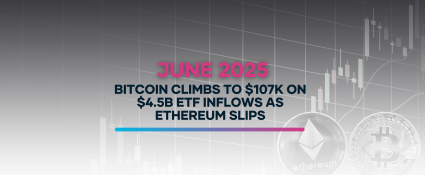SEC rejects VanEck’s spot Bitcoin ETF as BTC price falls below $63K
- The United States Securities and Exchange Commission, or SEC, has officially disapproved asset manager VanEck’s spot Bitcoin exchange-traded fund months after the firm submitted its application.
- According to a Friday filing, the SEC rejected a proposed rule change from the Cboe BZX Exchange to list and trade shares of VanEck’s Bitcoin (BTC) Trust. Specifically, the SEC said any rule change in favor of approving the ETF would not be “‘designed to prevent fraudulent and manipulative acts and practices” nor “protect investors and the public interest.”
- “The Commission concludes that BZX has not met its burden under the Exchange Act and the Commission’s Rules of Practice to demonstrate that its proposal is consistent with the requirements of Exchange Act Section,” said the SEC, adding:
- “It is essential for an exchange listing a derivative securities product to enter into a surveillance-sharing agreement with markets trading the underlying assets for the listing exchange to have the ability to obtain information necessary to detect, investigate, and deter fraud and market manipulation, as well as violations of exchange rules and applicable federal securities laws and rules.”
Cosmos, Solana Ventures Join $725M Series B for Crypto Gaming Platform Forte
- Crypto gaming startup Forte today announced it has taken in $725 million in Series B financing, adding to its haul of $185 million from a Series A round this May.
- Sea Capital and Kora Management led the funding round, with recognizable players such as Andreessen Horowitz, Animoca Brands, and Warner Music Group also participating. In a sign of Forte’s multichain ambitions, Cosmos, Polygon Studios and Solana Ventures—the venture wing of Solana Labs—all took part in the Series B.
- Forte is fine-tuning a platform that allows game creators to put blockchain elements into their games. That includes NFTs that players can collect as well as wallets to store them in. According to Forte, the vision is to move past the current gaming paradigm. “In blockchain-enabled games, players can truly own goods, rather than making pure entertainment expenditures,” it wrote in a press release. “Players around the world can freely trade goods and services with each other, and can participate in community economies that reward creativity, collaboration, and skill.”
Shark tank star Kevin O’Leary says crypto holdings comprise 10% of this portfolio
- In a live recording with Reddit’s r/CryptoCurrency Talk Thursday, Shark Tank celebrity Kevin O’Leary discussed how cryptocurrencies now make up 10% of his investment portfolio:
- “At the beginning of the year, I was at 3% weighting; the target was to get 7% by year-end. However, because of the appreciation of so many of the assets I have now, we’re almost at 10% today. Some people think the game is over, and Ethereum is it, but I don’t agree. There are many other alternatives, whether it be Solana or anything else. If you’re an investor like I am, you want diversification. That’s the key.”
Grayscale’s Metaverse Bet Is Paying Off: MANA Climbs 253% in Two Weeks
- Early investors in “metaverse” plays are today reaping large rewards, including the biggest asset manager in crypto, Grayscale.
- Grayscale CEO Michael Sonnenshein, who spoke at the Decrypt and Yahoo Finance Crypto Goes Mainstream event earlier this week, said the firm has seen “strong receptivity” to its Grayscale Decentraland Trust as a passive way for investors to get exposure to the metaverse.
- The metaverse pairs the virtual world and character building mechanics of games like SimCity and Minecraft with a native currency that can be traded for other cryptocurrencies or sold for fiat. For Decentraland, which runs on the Ethereum blockchain, that currency is MANA. It can be used to customize avatars and purchase parcels of virtual land.
SEC asks court to enforce subpoena against crypto startup Terraform Labs
- A spat between crypto startup Terraform Labs, its CEO Do Kwon and the Securities and Exchange Commission (SEC) entered a new phase when the U.S. securities regulator went to court seeking an order to enforce an investigative subpoena.
- Kwon was served with a subpoena during a crypto industry event in September in New York, and later filed a lawsuit against the SEC, arguing in court that he was improperly served and that the agency had violated his rights to due process. That lawsuit was filed on October 24 and confirmed the subpoena serving at the Mainnet conference, as well as details about the SEC’s investigation into the Mirror protocol.
- Now, the SEC wants a court order that would compel Kwon and Terraform Labs to “comply with investigative subpoenas for documents and testimony.”
Bitcoin’s long-anticipated Taproot upgrade is activated
- Taproot, Bitcoin’s long-anticipated code upgrade with a focus on enhancing the network’s privacy and security, has been activated.
- The upgrade went live when the Bitcoin blockchain reached block 709,632 at 5:15 UTC time on Sunday, which was mined and replayed by F2Pool. That has effectively activated the first major upgrade to the network’s code since the introduction of Segregated Witness in 2017.
- As The Block explained previously, Taproot introduces Schnorr signatures that can make more complex transactions on Bitcoin – such as those from multi-signature wallets – look like just any other transaction, hence improving the privacy and security of the transactions. The switch to Schnorr signatures also has implications for network scaling, as the Taproot upgrade swaps out the cryptographic framework ECDSA.











